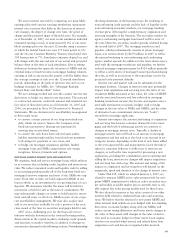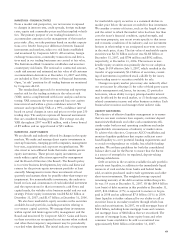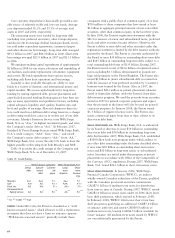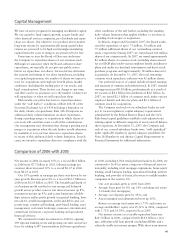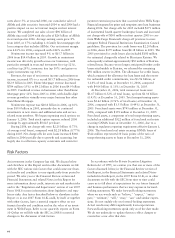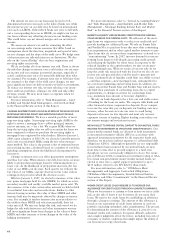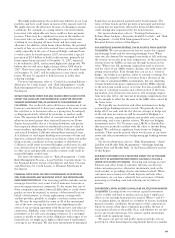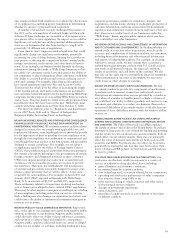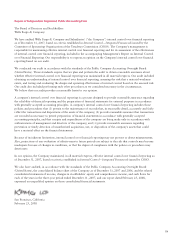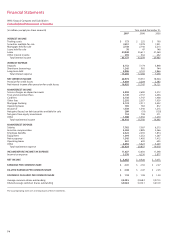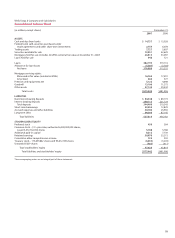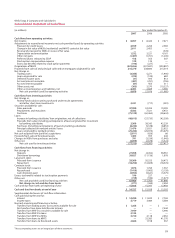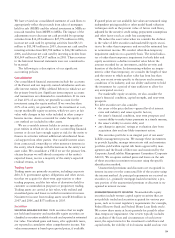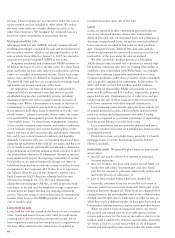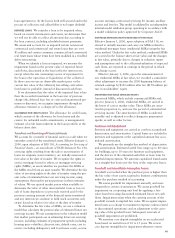Wells Fargo 2007 Annual Report Download - page 74
Download and view the complete annual report
Please find page 74 of the 2007 Wells Fargo annual report below. You can navigate through the pages in the report by either clicking on the pages listed below, or by using the keyword search tool below to find specific information within the annual report.71
also requires federal bank regulators to evaluate the effectiveness
of an applicant in combating money laundering in determining
whether to approve a proposed bank acquisition.
A number of states have recently challenged the position of
the OCC as the sole regulator of national banks and their sub-
sidiaries. If these challenges are successful or if Congress acts to
give greater effect to state regulation, the impact on us could be
significant, not only because of the potential additional restric-
tions on our businesses but also from having to comply with
potentially 50 different sets of regulations.
From time to time Congress considers legislation that could
significantly change our regulatory environment, potentially
increasing our cost of doing business, limiting the activities we
may pursue or affecting the competitive balance among banks,
savings associations, credit unions, and other financial institu-
tions. As an example, our business model depends on sharing
information among the family of Wells Fargo businesses to bet-
ter satisfy our customers’ needs. Laws that restrict the ability of
our companies to share information about customers could limit
our ability to cross-sell products and services, reducing our rev-
enue and earnings. For example, federal financial regulators
have issued regulations under the Fair and Accurate Credit
Transactions Act which have the effect of increasing the length
of the waiting period, after privacy disclosures are provided to
new customers, before information can be shared among Wells Fargo
companies for the purpose of cross-selling Wells Fargo's products
and services. This may result in certain cross-sell programs being
less effective than they have been in the past. Wells Fargo must
comply with these regulations not later than October 1, 2008.
For more information, refer to “Regulation and Supervision”
in our 2007 Form 10-K and to “Report of Independent
Registered Public Accounting Firm” in this Report.
WE MAY INCUR FINES, PENALTIES AND OTHER NEGATIVE CONSEQUENCES
FROM REGULATORY VIOLATIONS, POSSIBLY EVEN INADVERTENT OR
UNINTENTIONAL VIOLATIONS. We maintain systems and procedures
designed to ensure that we comply with applicable laws and
regulations. However, some legal/regulatory frameworks provide
for the imposition of fines or penalties for noncompliance even
though the noncompliance was inadvertent or unintentional and
even though there was in place at the time systems and procedures
designed to ensure compliance. For example, we are subject
to regulations issued by the Office of Foreign Assets Control
(OFAC) that prohibit financial institutions from participating in
the transfer of property belonging to the governments of certain
foreign countries and designated nationals of those countries.
OFAC may impose penalties for inadvertent or unintentional
violations even if reasonable processes are in place to prevent
the violations. Therefore, the establishment and maintenance
of systems and procedures reasonably designed to ensure com-
pliance cannot guarantee that we will be able to avoid a fine
or penalty for noncompliance. For example, in April 2003 and
January 2005 OFAC reported settlements with Wells Fargo
Bank, N.A. in amounts of $5,500 and $42,833, respectively.
These settlements related to transactions involving inadvertent
acts or human error alleged to have violated OFAC regulations.
There may be other negative consequences resulting from a finding
of noncompliance, including restrictions on certain activities.
Such a finding may also damage our reputation (see below) and
could restrict the ability of institutional investment managers to
invest in our securities.
NEGATIVE PUBLICITY COULD DAMAGE OUR REPUTATION. Reputation
risk, or the risk to our earnings and capital from negative public
opinion, is inherent in our business. Negative public opinion
could adversely affect our ability to keep and attract customers
and expose us to adverse legal and regulatory consequences.
Negative public opinion could result from our actual or alleged
conduct in any number of activities, including lending practices,
corporate governance, regulatory compliance, mergers and
acquisitions, and disclosure, sharing or inadequate protection of
customer information, and from actions taken by government
regulators and community organizations in response to that con-
duct. Because we conduct most of our businesses under the
“Wells Fargo” brand, negative public opinion about one busi-
ness could affect our other businesses.
WE DEPEND ON THE ACCURACY AND COMPLETENESS OF INFORMATION
ABOUT CUSTOMERS AND COUNTERPARTIES. In deciding whether to
extend credit or enter into other transactions, we rely on the
accuracy and completeness of information about our customers,
including financial statements and other financial information
and reports of independent auditors. For example, in deciding
whether to extend credit, we may assume that a customer’s
audited financial statements conform with U.S. GAAP and pre-
sent fairly, in all material respects, the financial condition,
results of operations and cash flows of the customer. We also
may rely on the audit report covering those financial statements.
If that information is incorrect or incomplete, we may incur
credit losses or other charges to earnings.
WE RELY ON OTHERS TO HELP US WITH OUR OPERATIONS. We rely
on outside vendors to provide key components of our business
operations such as internet connections and network access.
Disruptions in communication services provided by a vendor or
any failure of a vendor to handle current or higher volumes of
use could hurt our ability to deliver products and services to our
customers and otherwise to conduct our business. Financial or
operational difficulties of an outside vendor could also hurt our
operations if those difficulties interfere with the vendor’s ability
to serve us.
FEDERAL RESERVE BOARD POLICIES CAN SIGNIFICANTLY IMPACT
BUSINESS AND ECONOMIC CONDITIONS AND OUR FINANCIAL RESULTS
AND CONDITION. The Federal Reserve Board (FRB) regulates
the supply of money and credit in the United States. Its policies
determine in large part our cost of funds for lending and investing
and the return we earn on those loans and investments, both of
which affect our net interest margin. They also can materially
affect the value of financial instruments we hold, such as debt
securities and MSRs. Its policies also can affect our borrowers,
potentially increasing the risk that they may fail to repay their
loans. Changes in FRB policies are beyond our control and can
be hard to predict.
OUR STOCK PRICE CAN BE VOLATILE DUE TO OTHER FACTORS. Our
stock price can fluctuate widely in response to a variety of
factors, in addition to those described above, including:
• general business and economic conditions;
• recommendations by securities analysts;
• new technology used, or services offered, by our competitors;
• operating and stock price performance of other companies
that investors deem comparable to us;
• news reports relating to trends, concerns and other issues
in the financial services industry;
• changes in government regulations;
• natural disasters; and
• geopolitical conditions such as acts or threats of terrorism
or military conflicts.


